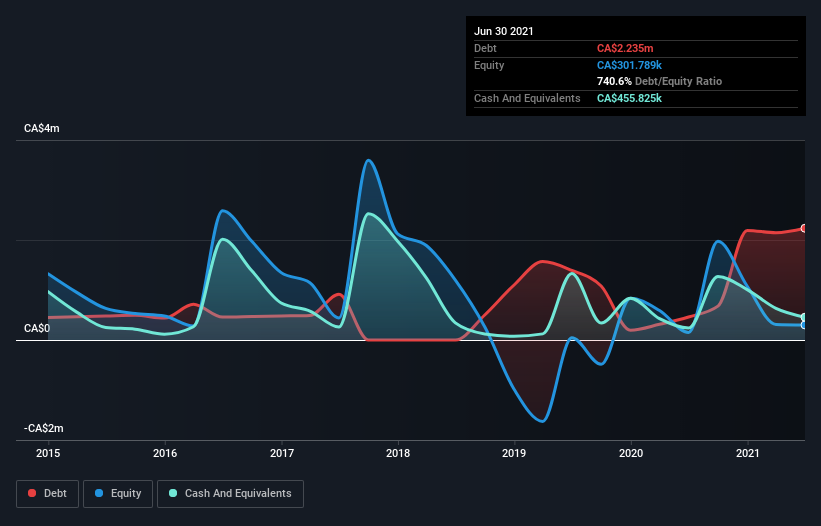
Howard Marks put it nicely when he said that, rather than worrying about share price volatility, 'The possibility of permanent loss is the risk I worry about... and every practical investor I know worries about.' When we think about how risky a company is, we always like to look at its use of debt, since debt overload can lead to ruin. Importantly, Kane Biotech Inc. (CVE:KNE) does carry debt. But should shareholders be worried about its use of debt?
Why Does Debt Bring Risk?
Debt is a tool to help businesses grow, but if a business is incapable of paying off its lenders, then it exists at their mercy. Part and parcel of capitalism is the process of 'creative destruction' where failed businesses are mercilessly liquidated by their bankers. However, a more usual (but still expensive) situation is where a company must dilute shareholders at a cheap share price simply to get debt under control. Having said that, the most common situation is where a company manages its debt reasonably well - and to its own advantage. When we think about a company's use of debt, we first look at cash and debt together.
See our latest analysis for Kane Biotech
What Is Kane Biotech's Debt?
As you can see below, at the end of June 2021, Kane Biotech had CA$2.24m of debt, up from CA$460.1k a year ago. Click the image for more detail. However, it does have CA$455.8k in cash offsetting this, leading to net debt of about CA$1.78m.

A Look At Kane Biotech's Liabilities
According to the last reported balance sheet, Kane Biotech had liabilities of CA$3.15m due within 12 months, and liabilities of CA$2.29m due beyond 12 months. Offsetting this, it had CA$455.8k in cash and CA$891.6k in receivables that were due within 12 months. So its liabilities outweigh the sum of its cash and (near-term) receivables by CA$4.09m.
Kane Biotech has a market capitalization of CA$16.1m, so it could very likely raise cash to ameliorate its balance sheet, if the need arose. But it's clear that we should definitely closely examine whether it can manage its debt without dilution. There's no doubt that we learn most about debt from the balance sheet. But you can't view debt in total isolation; since Kane Biotech will need earnings to service that debt. So when considering debt, it's definitely worth looking at the earnings trend. Click here for an interactive snapshot.
Over 12 months, Kane Biotech made a loss at the EBIT level, and saw its revenue drop to CA$1.3m, which is a fall of 19%. That's not what we would hope to see.
Caveat Emptor
While Kane Biotech's falling revenue is about as heartwarming as a wet blanket, arguably its earnings before interest and tax (EBIT) loss is even less appealing. Indeed, it lost a very considerable CA$4.2m at the EBIT level. Considering that alongside the liabilities mentioned above does not give us much confidence that company should be using so much debt. Quite frankly we think the balance sheet is far from match-fit, although it could be improved with time. Another cause for caution is that is bled CA$3.6m in negative free cash flow over the last twelve months. So in short it's a really risky stock. There's no doubt that we learn most about debt from the balance sheet. But ultimately, every company can contain risks that exist outside of the balance sheet. For instance, we've identified 6 warning signs for Kane Biotech (2 shouldn't be ignored) you should be aware of.
When all is said and done, sometimes its easier to focus on companies that don't even need debt. Readers can access a list of growth stocks with zero net debt 100% free, right now.
Valuation is complex, but we're here to simplify it.
Discover if Kane Biotech might be undervalued or overvalued with our detailed analysis, featuring fair value estimates, potential risks, dividends, insider trades, and its financial condition.
Access Free AnalysisThis article by Simply Wall St is general in nature. We provide commentary based on historical data and analyst forecasts only using an unbiased methodology and our articles are not intended to be financial advice. It does not constitute a recommendation to buy or sell any stock, and does not take account of your objectives, or your financial situation. We aim to bring you long-term focused analysis driven by fundamental data. Note that our analysis may not factor in the latest price-sensitive company announcements or qualitative material. Simply Wall St has no position in any stocks mentioned.
Have feedback on this article? Concerned about the content? Get in touch with us directly. Alternatively, email editorial-team (at) simplywallst.com.
About TSXV:KNE
Kane Biotech
A biotechnology company, engages in the research, development, and commercialization of technologies and products that prevent and remove microbial biofilms in Canada and internationally.
Moderate with imperfect balance sheet.
Market Insights
Community Narratives



